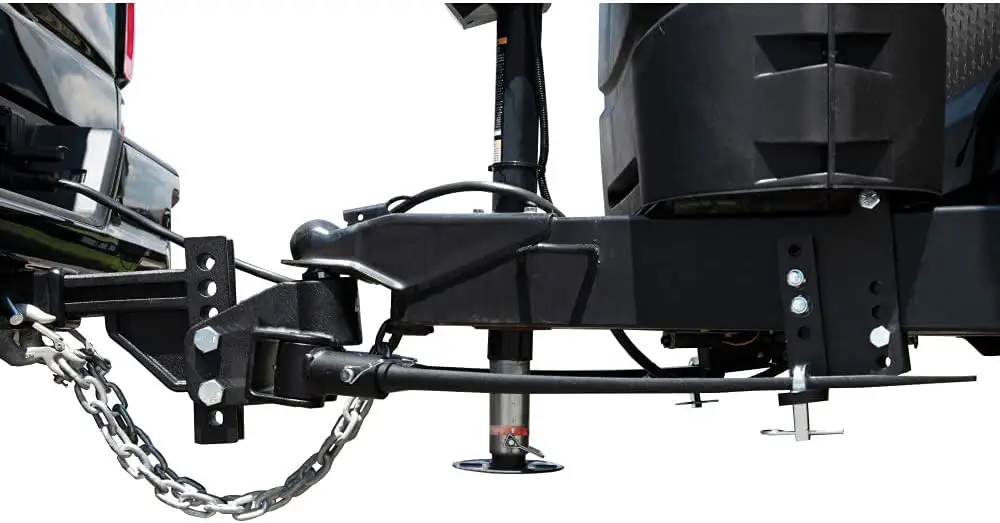This post may contain affiliate links which means I may receive a small commission for purchases made through the links. Learn More
When it comes to towing a trailer, safety is of the utmost importance. One crucial component in ensuring safe towing is a weight distribution hitch. But, with so many options on the market, it can be overwhelming to determine what size weight distribution hitch is right for your specific towing needs.
What size weight distribution do I need? The size of the hitch always depends on the gross weight of the trailer and the tension weight. You should always choose a weight distribution hitch rated for higher weight than the gross weight of the trailer. If your trailer has a gross weight of 8000 lbs, then go with the WDH rated for 8500 lbs weight.
It was just a brief introduction, but I have a lot more information to share with you. In this blog post, I’ll break down the factors to consider when choosing a weight distribution hitch that will help you in choosing the suitable size of weight distribution hitch. So, stay connected!
Related Article: How to Hook Up Gooseneck Trailer?
How to Choose a Suitable Size of Weight Distribution Hitch?
Well, there is no exact answer about what size you should go with. Instead, there are a few factors that you should consider in order to understand the appropriate size of the hitch. These factors are listed below;
- Gross Trailer Weight (GTW)
- Tongue Weight (TW)
- Vehicle weight
- Type of trailer you’ll be towing.
Before I take you to more details, you need to understand what the above-given terminologies mean.
Gross Trailer Weight (GTW) refers to the total weight of the trailer, including all cargo and any additional equipment. Tongue Weight (TW) is the weight that is exerted on the hitch ball by the trailer. It’s important to note that TW should be between 10-15% of the Gross Trailer Weight (GTW).
When you know the GTW and TW of your trailer then it becomes very easy for you to determine the appropriate weight distribution hitch for your towing needs.
Additional Knowledge: It’s also important to consider the weight of your vehicle and the type of trailer you’ll be towing. Make sure to check the vehicle’s towing capacity and ensure that the weight distribution hitch you choose is compatible with your specific make and model.
What Size Weight Distribution Hitch Do You Need?
The answer to this question is directly linked to the gross weight of the trailer. You should always choose the weight distribution hitch which is rated according to the weight of the trailer. Suppose the gross of your trailer is 6500 lbs, then make sure to choose the WDH which is rated for at least 7500 lbs.
Important Point: It is an ideal case scenario if you opt for a hitch size rated for more weight than the gross weight of your trailer. However, choosing a hitch rated for exactly the same weight as the trailer is fine too.
Another important thing is the tension weight. If your trailer has a weight of 6500 lbs with a tension weight of 650 lbs, then you will have to choose a hitch rated for at least 750 lbs of tension weight.
But the question still stands: how will you find the gross weight of the trailer and tongue weight? The answer to this question will be explained in the upcoming part of this guide.
How to Find the Gross Trailer Weight & Tension Weight?
As said earlier, to know the ideal size of the weight distribution hitch, it’s important to accurately measure the Gross Trailer Weight (GTW) and Tongue Weight (TW) of your trailer. There are a few ways to do this, but the most accurate method is to use a scale.
- You can use a public scale, such as those found at truck stops, to weigh your trailer. Make sure to weigh the trailer with all cargo and equipment loaded, as well as any additional weight that will be added while towing.
- Another option is to use a portable scale specifically designed for weighing trailers. These can be found at many RV and trailer supply stores.
It’s also possible to calculate the GTW and TW by using the weight of the trailer and adding the weight of all cargo and equipment. However, this method is less accurate and should only be used only for estimation.
Can any size of weight distribution hitch be used with any type of trailer or tow vehicle?
No, not any size of weight distribution hitch can be used with any type of trailer or tow vehicle. It’s important to choose the right weight distribution hitch for your specific towing setup, taking into account factors such as the gross weight of the trailer, the weight of the cargo, and the weight capacity of the tow vehicle.
Keep in mind that when you use the wrong size or type of weight distribution hitch then it can result in reduced stability, decreased towing performance, and even potential safety hazards. So, it is very important to have proper knowledge about the trailer weight and then choose the hitch accordingly.
Types of Weight Distribution Hitches:
When it comes to weight distribution hitches, there are a few different types to choose from. Apart from hitch size, which type of hitch you also need matters. Below are some types that will give you more information about choosing a suitable hitch for yourself.
Related Article: What are Different Types of Trailer Hitches and Classes?
1- Sway control hitches
They are designed to prevent the trailer from swaying while in motion. They utilize friction to keep the trailer stable and are a popular choice for travel trailers.
2- Round bar hitches
They are the most basic type of weight distribution hitch and utilize round bars to distribute the weight of the trailer. I recommend you use them for utility trailers.
3- Trunnion bar hitches
They are similar to round bar hitches, but they use a trunnion system to distribute the weight of the trailer. This design allows for a more equal distribution of weight, making them a suitable choice for larger trailers.
4- Dual cam hitches
They are the most advanced type of weight distribution hitch. They utilize both sway control and weight distribution to provide the ultimate stability and control. I suggest you choose them for larger, heavy-duty trailers.
Frequently Asked Questions
It is generally not recommended to oversize a weight distribution hitch. Doing so can negatively impact the handling and stability that will lead to unsafe driving conditions.
Yes, weight distribution hitches can be used with a 2-inch hitch ball. However, it’s important to check the weight capacity of the hitch ball and ensure that it’s compatible with the weight of your trailer.
Conclusion
Knowing the size requirement is very important as it helps you choose the perfect hitch for your needs. In this guide, I have explained everything in detail that will help you know about the size of the weight distribution hitch that you will need for your work. Keep in mind that the gross weight of the trailer and tension weight are the two most important factors that control your hitch selection process. I hope that this guide will be helpful to you.

I’m Ahmad – the owner of this website and the writer of this post. I’ve spent 15 years in the automotive industry, especially among the hitches. What you’re reading is the experience of my 15 years.

